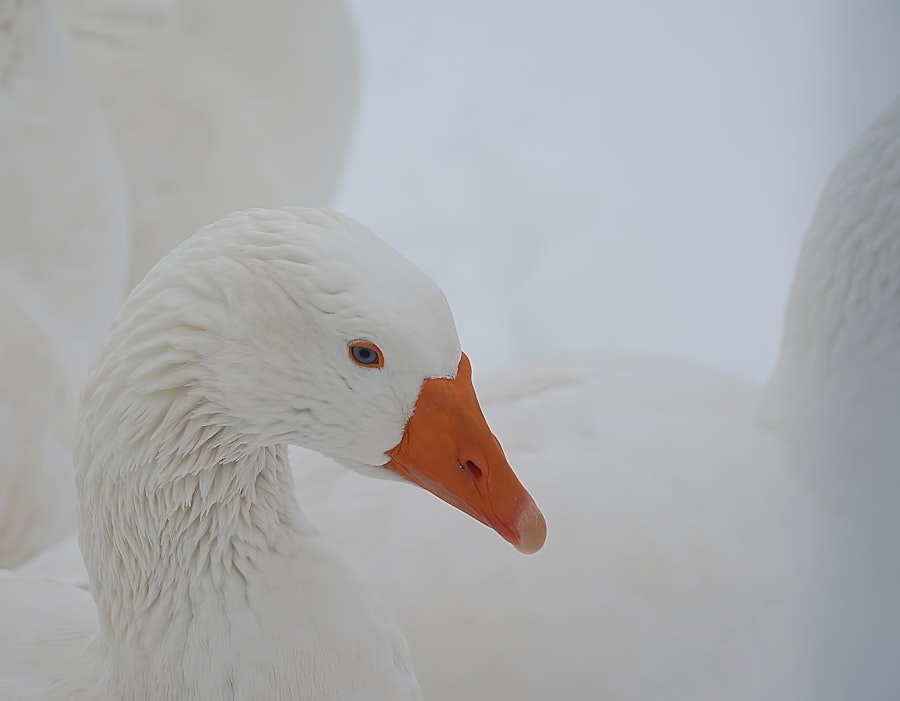Geese are fascinating and beautiful creatures that have been domesticated for thousands of years. They are known for their intelligence, loyalty, and strong family bonds. Keeping geese as neighbors can be a rewarding experience, as they can provide a variety of benefits to their human counterparts. However, it is important to understand the responsibilities and challenges that come with keeping geese, as well as how to ensure their happiness and health. Building a positive relationship with geese is essential for living harmoniously with them, and it requires patience, understanding, and respect for these remarkable birds.
Key Takeaways
- Geese can make great neighbors with proper care and understanding.
- Having geese as neighbors can provide benefits such as pest control and entertainment.
- Responsibilities of keeping geese include providing proper shelter, food, and healthcare.
- Challenges of keeping geese may include noise, mess, and potential aggression.
- Tips for keeping geese happy and healthy include providing a balanced diet and regular exercise.
Benefits of Having Geese as Neighbors
There are numerous benefits to having geese as neighbors. One of the most obvious benefits is their ability to serve as natural lawn mowers. Geese are herbivores and enjoy grazing on grass, weeds, and other vegetation. This can be particularly useful for keeping lawns and fields well-maintained without the need for chemical herbicides or mechanical mowing equipment. Additionally, geese are excellent at controlling pests such as slugs, snails, and insects, making them a valuable asset for organic gardening and pest management.
Another benefit of having geese as neighbors is their role as natural security alarms. Geese are highly territorial and will alert their owners to the presence of strangers or potential threats with their loud honking and aggressive behavior. This can be particularly useful for deterring trespassers or predators on a property. Furthermore, geese can provide companionship and entertainment for their human neighbors, as they are social animals that enjoy interacting with people and other animals. Overall, having geese as neighbors can enrich the lives of their human counterparts in numerous ways.
Responsibilities of Keeping Geese
Keeping geese comes with a set of responsibilities that should not be taken lightly. One of the most important responsibilities is providing proper shelter and protection for the geese. This includes a secure and comfortable coop or shelter to protect them from predators, extreme weather, and other potential dangers. Additionally, geese require access to clean water for drinking and bathing, as well as a balanced diet that includes a variety of grains, greens, and other nutritious foods.
Another responsibility of keeping geese is ensuring their physical and mental well-being. This includes providing ample space for them to roam and graze, as well as opportunities for exercise and mental stimulation. Geese are intelligent animals that thrive on social interaction and mental challenges, so it is important to provide them with companionship and enrichment to prevent boredom and behavioral issues. Additionally, regular health checks and veterinary care are essential for keeping geese healthy and preventing the spread of diseases.
Challenges of Keeping Geese
While there are many benefits to having geese as neighbors, there are also challenges that come with keeping these birds. One of the main challenges is managing their natural behaviors, such as honking, grazing, and nesting. Geese can be noisy animals, especially during mating season or when they feel threatened, which can be disruptive to neighbors in close proximity. Additionally, their grazing habits can lead to damage to lawns and gardens if not managed properly.
Another challenge of keeping geese is their territorial nature and potential aggression towards humans or other animals. Geese can be protective of their nests and offspring, which may lead to aggressive behavior if they feel threatened. It is important for goose keepers to understand how to safely interact with geese and prevent potential conflicts. Furthermore, geese are susceptible to certain health issues and diseases that require proactive management and care to ensure their well-being.
Tips for Keeping Geese Happy and Healthy
There are several tips for keeping geese happy and healthy as neighbors. Providing a spacious and secure outdoor area for them to roam and graze is essential for their physical and mental well-being. This can include access to a pond or water source for swimming and bathing, as well as plenty of grass and vegetation to forage on. Additionally, providing a balanced diet that includes grains, greens, and supplemental nutrients will help keep geese healthy and satisfied.
Social interaction is also important for keeping geese happy. Geese are social animals that thrive on companionship, so it is beneficial to keep them in pairs or small groups whenever possible. This can help prevent loneliness and boredom, which can lead to behavioral issues in geese. Providing enrichment activities such as toys, puzzles, or opportunities for exploration can also help keep geese mentally stimulated and engaged.
Regular health checks and preventative care are crucial for keeping geese healthy. This includes monitoring their weight, checking for signs of illness or injury, and providing vaccinations or treatments as needed. Additionally, maintaining a clean living environment and practicing good hygiene can help prevent the spread of diseases among geese.
Building a Positive Relationship with Geese

Building a positive relationship with geese requires patience, understanding, and respect for these remarkable birds. It is important to approach geese calmly and confidently, while also giving them space and allowing them to approach on their own terms. Establishing trust through positive interactions such as offering treats or gentle petting can help build a bond with geese over time.
Understanding their body language and vocalizations can also help in building a positive relationship with geese. Learning to interpret their behaviors and signals can help prevent misunderstandings or potential conflicts. Additionally, setting clear boundaries and using positive reinforcement techniques can help establish mutual respect between humans and geese.
Respecting their natural instincts and behaviors is essential for building a positive relationship with geese. This includes understanding their need for space, privacy during nesting season, and respect for their territorial nature. By acknowledging and accommodating these natural behaviors, humans can foster a harmonious relationship with geese as neighbors.
Living harmoniously with Geese
In conclusion, keeping geese as neighbors can be a rewarding experience that offers numerous benefits to their human counterparts. However, it is important to understand the responsibilities and challenges that come with keeping geese in order to ensure their happiness and well-being. By providing proper shelter, nutrition, social interaction, and veterinary care, humans can help keep geese healthy and content.
Building a positive relationship with geese requires patience, understanding, and respect for their natural instincts and behaviors. By approaching them calmly and confidently, establishing trust through positive interactions, and respecting their boundaries, humans can foster a harmonious relationship with geese as neighbors. Overall, living harmoniously with geese requires proactive care, mutual respect, and a willingness to understand and appreciate these remarkable birds as valuable members of the community.
If you’re considering keeping geese as pets, you may also be interested in learning about the ideal door size for a chicken coop. A well-designed chicken coop can provide valuable insights into creating a comfortable and safe environment for your geese. Check out this article on chicken coop door size to ensure that your coop is suitable for both chickens and geese.
FAQs
What are some reasons why neighbors keep geese?
Some neighbors keep geese for various reasons such as for their meat, eggs, feathers, or as pets. Geese can also be used for weed control and as guard animals to alert owners of potential intruders.
What are some potential issues with neighbors keeping geese?
Some potential issues with neighbors keeping geese include noise from their honking, mess from their droppings, and potential aggression towards people or other animals. Additionally, geese may wander onto neighboring properties and cause damage to gardens or landscaping.
Are there any regulations or laws regarding keeping geese as pets in residential areas?
Regulations and laws regarding keeping geese as pets in residential areas vary by location. Some areas may have restrictions on the number of geese that can be kept, noise ordinances, and zoning regulations. It is important to check with local authorities or homeowner’s associations for any applicable regulations.
How can neighbors address issues related to keeping geese?
Neighbors can address issues related to keeping geese by having open and respectful communication with each other. They can discuss concerns and potential solutions, such as noise reduction measures, fencing to contain the geese, or cleaning up any messes. If issues cannot be resolved amicably, neighbors may need to involve local authorities or mediation services.
Meet Walter, the feathered-friend fanatic of Florida! Nestled in the sunshine state, Walter struts through life with his feathered companions, clucking his way to happiness. With a coop that’s fancier than a five-star hotel, he’s the Don Juan of the chicken world. When he’s not teaching his hens to do the cha-cha, you’ll find him in a heated debate with his prized rooster, Sir Clucks-a-Lot. Walter’s poultry passion is no yolk; he’s the sunny-side-up guy you never knew you needed in your flock of friends!







